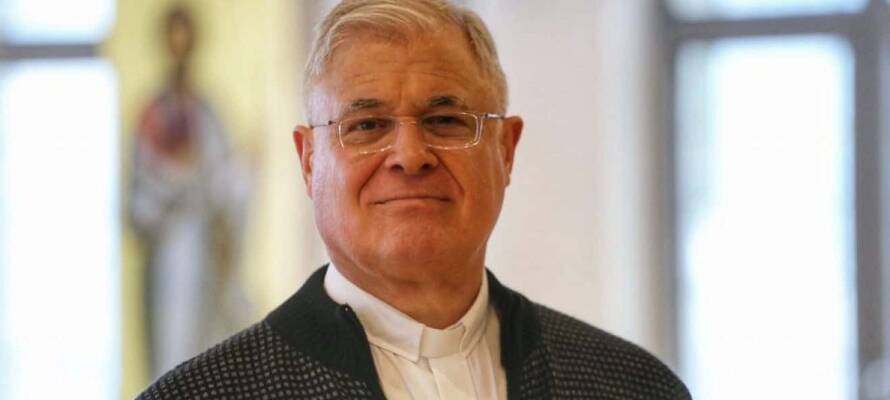More than 200,000 Israelis have been evacuated from communities near the Gaza Strip and Lebanese border.
By Eitan Elhadez-Barak, JNS
Waves gently lapped on the lakeshore as two boys happily kicked a soccer ball back and forth. A flock of cranes flew overhead in the direction of the Hula Valley. The western shore of the Sea of Galilee, known for its cluster of Christian sites, was peacefully tranquil until two helicopter gunships passed by, heading towards the Lebanese border—a reminder of the war taking place just a few miles away.
Nestled on the banks of the Sea of Galilee’s western shore lies the Magdala Hotel. In other years, during the Christmas season the hotel would be hosting Christian pilgrims visiting nearby holy sites such as Capernaum, the Mount of Beatitudes, the “Jesus boat” at Kibbutz Ginosar, and more.
But thanks to the war, the hotel is hosting 200 evacuees. Atheist Jewish kibbutzniks can be found alongside Catholic monks, the mostly Muslim hotel staff, and Druze workers, all holding prayers for the peace of the land. It’s a little bubble of coexistence on Route 90 on the outskirts of Tiberias.
“When the war broke out, we had a lot of reservations canceled and there was a debate about whether to close and send the employees home,” said Maron Issa, the Maronite Christian manager of the hotel. “But unlike during the Corona period, we decided in a brave act as a service to the community to open the place for the special community of Kibbutz Yiron,” he continued.
As the hotel became a permanent residence, the problems of those who come to stay for a few days become the hotel’s problems, and an opportunity to show resilience. The weekly menu was adjusted to give the evacuees more variety. Internet connectivity was upgraded to meet the burgeoning number of users. A donation of washing machines led to the opening of a “laundry room.”
The hotel’s playground became a kindergarten and the lecture hall became an elementary school. High school students go to a nearby college.
The cooperation is appreciated by the members of Kibbutz Yiron. Their community, right on the Lebanese border, was among the first to be evacuated amid the conflict with Hezbollah.
“The hotel is really [making an effort], but in fact the families have been living in a ‘bedroom’ for several months and this creates pressure,” said Nitzan Amit, the kibbutz’s community manager. “The lobby of the hotel is a kind of club for us. In the morning you will see adults here chatting, or people who have turned it into a small office with their computer. In the evening the children come and run around. We have a kibbutz atmosphere,” she said.
Outside, near the lake, Assaf Avnaim sits on a bench watching his son play ball with a friend. Most frustrating for Avnaim is the inability to make plans.
“Let the government tell us how long we will stay here so that we can know how to organize. I have been living with a sense of distrust since the seventh of October, and I no longer know who to believe,” he said.
“I am very afraid that agreements will be made at the expense of the residents of the communities that are close to the fence. There is also a crisis of trust with the army after what happened. Our lives are currently on hold in the hotel. There are conditions for vacations but not for permanent residence, and we can’t even get to our homes because there are army checkpoints,” he added bitterly.
The Magdala Hotel is a special story in the local tourism landscape. It was built on the ruins of a resort beach that flourished in the 1980s then died out over time. It was purchased in 2006 by Father Juan Solana, from Mexico, who belongs to the “Legionaries of Jesus,” a small Catholic order.
During the construction of the hotel, the remains of a First Century synagogue were uncovered, as well as the houses of the Jewish fishing town “Migdal” or “Magdala,” which is mentioned by both Flavius Josephus and the Christian Bible. The remains of an even older fishing boat found on the property are now displayed on Kibbutz Ginnosar a little further up Route 90. Christian pilgrims call it the “Jesus boat.”
Father Solana said that after the “terrible crisis that befell Israel” on Oct. 7, “We thought it was time to be more sensitive and compassionate.”
So when the government contacted the hotel about hosting evacuees, saying yes was easy. Since the war broke out, more than 200,000 Israelis have been evacuated from communities near the Gaza Strip and Lebanese border.
“This place was not only designed to make money, but to serve as a shelter for the three religions. To give hope,” said Solana. “We have Muslim, Jewish and Christian people in the management team, and we feel like members of one family. I think that coming here, one can feel the ability of the place to heal.”
